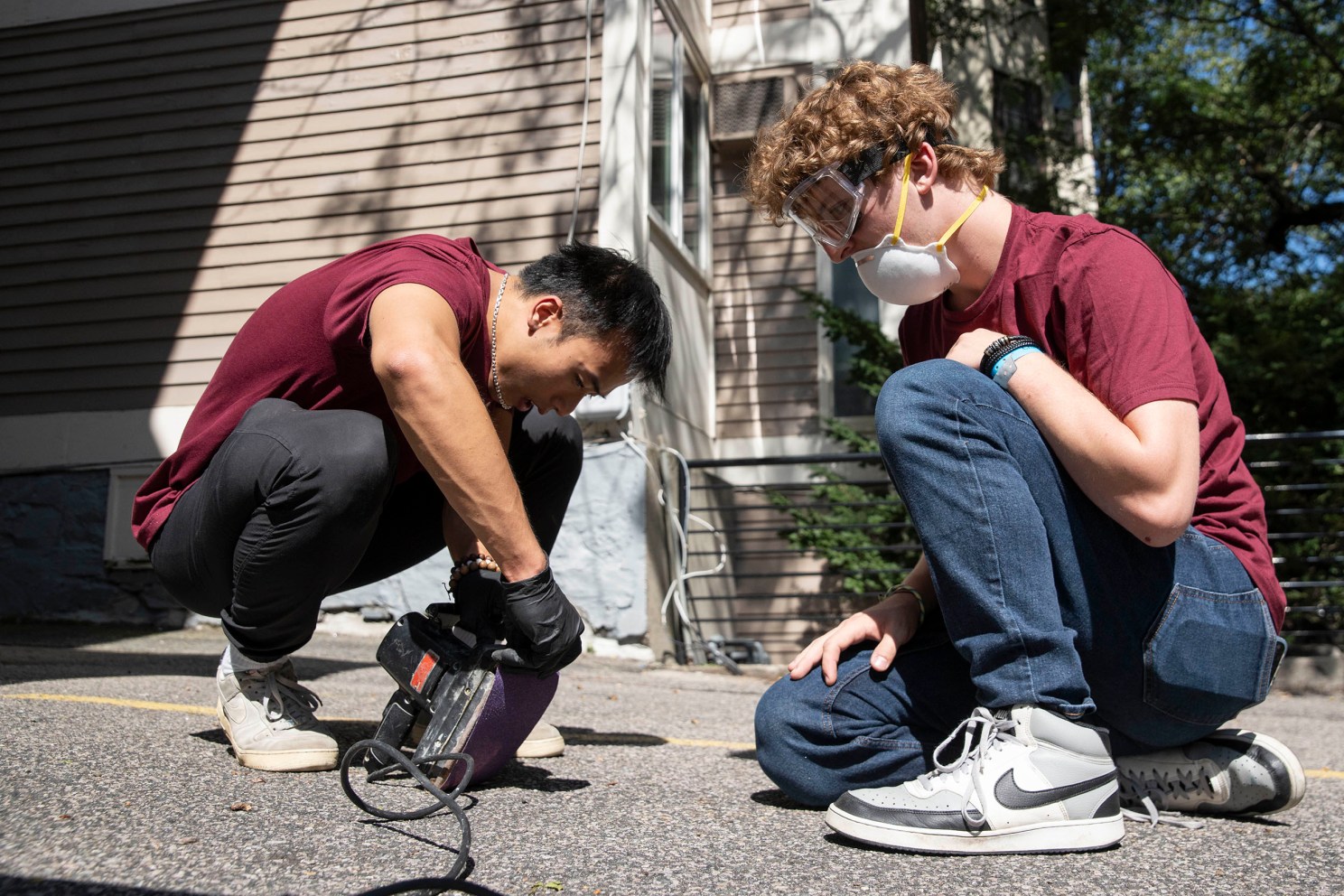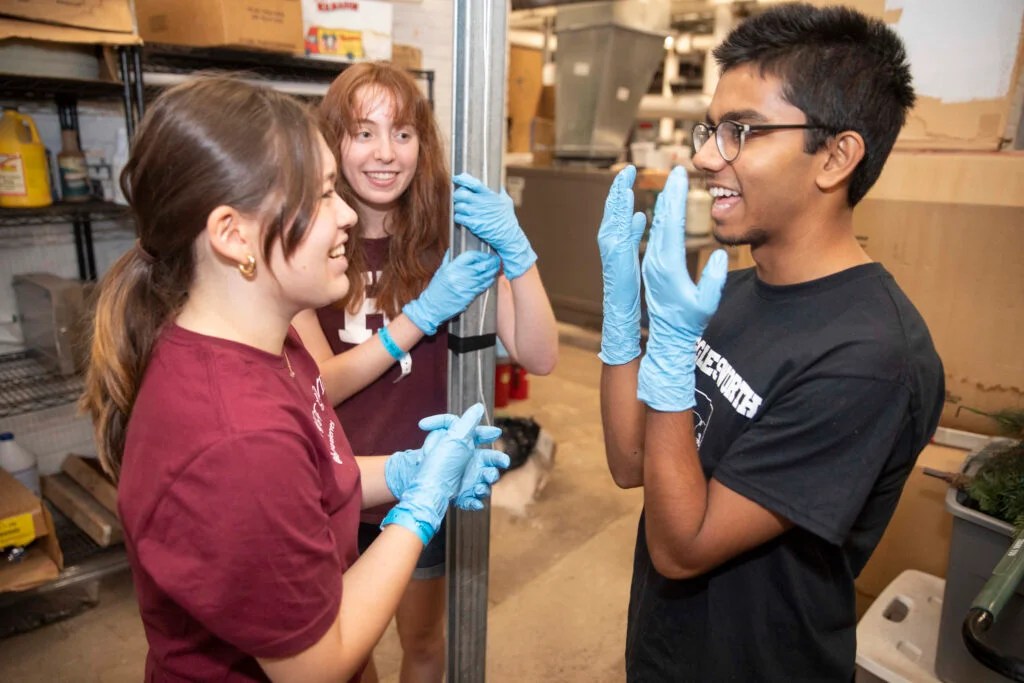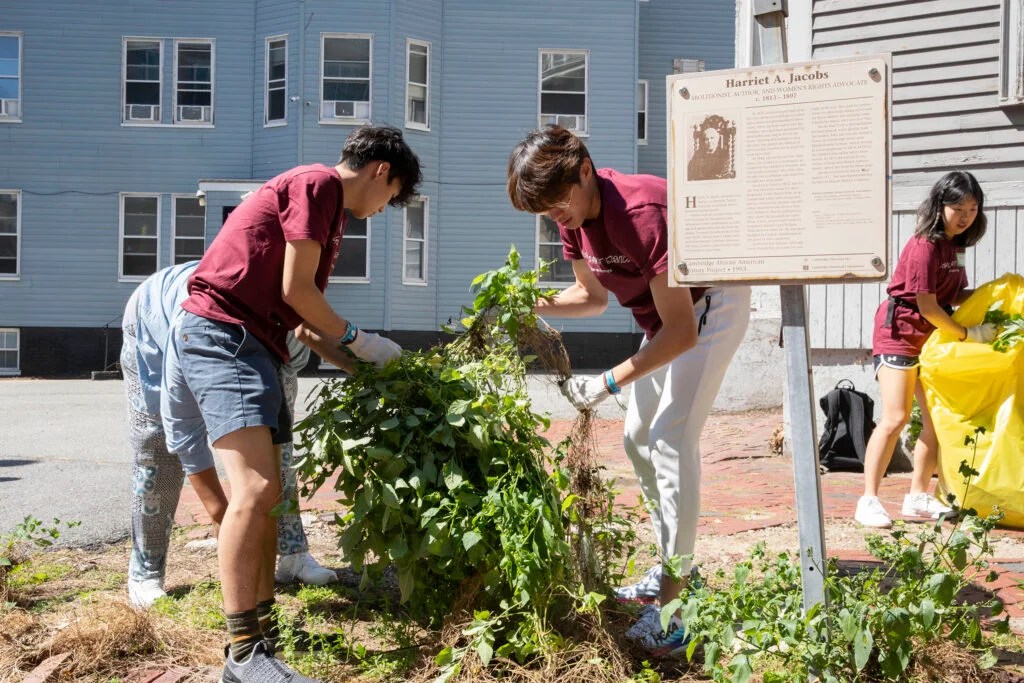
Xuanthe Nguyen ’25 (left) and Luke Blanchette ’27 prep the sander before they tackle fences at the historic Harriet Jacobs House in Cambridge.
Niles Singer/Harvard Staff Photographer
Harvard lends a hand
Student volunteers spread the reach of the fourth Global Day of Service
Scores of Harvard-affiliated volunteers tackled more than 75 community service projects in the Greater Boston area and around the world as part of the Global Day of Service.
This year’s program, now in its fourth iteration, engaged more than 1,200 volunteers and brought an infectious energy boost that has become a familiar feeling on campus. Alumni and undergraduate and graduate students came together to clean up playgrounds, conduct surveys, deliver food, and serve their communities in countless other ways.
Travis Lovett, assistant dean of civic engagement and service at Harvard College, explained that the First-Year Day of Service got an unlikely upgrade in 2020, when the COVID-19 pandemic forced him and his team to “figure out who we are … because social distancing is so counterintuitive” to the mission of global service.

During Day of Service, Cindy DeDianous (from left) Emerson Utgaard, and Fhasal Alam (right) and volunteers who are all members of the Class of 2027 assist the City of Boston with a clean-up at Roslindale Community Center.
Kris Snibbe/Harvard Staff Photographer
So, they pivoted. The Center for Public Service and Engaged Scholarship rebranded the program the Global Day of Service, connecting students with virtual service opportunities covering everything from voter registration and tutoring to social media and awareness campaigns. These virtual activities opened the door on a world of creative potential. Lovett said the pandemic helped him realize “that students have all these amazing skills in graphic design, or a different language, or data visualization or coding,” and they were able put their diverse talents to use despite the constraints imposed by social distancing.
That flex stuck. Although most of this year’s dozens of service opportunities were completed in person, about a third of the projects were done virtually, supporting work on five continents. These remote programs gave students an accessible, flexible option for contributing to causes such as curriculum development for a London-based youth engagement group, fundraising for international humanitarian nonprofits, and spreading awareness about the Cambridge Women’s Center on social media.
Kiran Ahmad, a junior from New York, worked as a project leader to craft Instagram posts for the Women’s Center that would be “welcoming for every woman” without seeming “too fancy” or exclusive.
Projects like this marshal volunteers as a built-in focus group for outreach materials, Lovett said. He also noted that each remote program included a designated “campus hangout spot” to simplify collaboration between volunteers and help build community between them.
With the Women’s Center project, co-leaders Ahmad and Langa Siziba, a junior from Zimbabwe, gathered with other volunteers in Sever Hall. Roaa Marei, a junior from Chicago, explained that the project provided a way to “give back to our community” using technology.

Ethan Kiang ’27 (left) and Perce Thaveesittikullarp ’27 pull weeds from the garden in front of the house. Undergraduates and alumni volunteered at the Harriet Jacobs House in Cambridge, MA as a part of the 2023 Global Day of Service. Volunteers sanded and painted railings around the Harriet Jacobs House and helped make improvements to garden beds. The Harriet Jacobs Legacy Committee strives to build community wellness and promote cross-cultural understanding. Focusing on sustainable food and culture, the organization values and respects diversity in our food systems, cultures, and cultural presentations. It also aims to improve the lives of economically, socially disadvantaged, and underserved individuals through its economic development programs.
Niles Singer/Harvard Staff Photographer
Marei, Ahmad, and Siziba had all contributed to previous service projects through organizations and programs such as Phillips Brooks House Association, the Y2Y Harvard Square Homeless Shelter, and the Global Day of Service itself.
Not only does the Day of Service help many of the student volunteers “feel a lot more fulfilled” as they start the semester, said Siziba, it also “makes the transition into long-term service easier” by familiarizing volunteers with Harvard’s service groups.
This is a point that Lovett emphasizes often. Although the Global Day of Service only lasts one day and aims to use “short bursts of energy” to propel dormant service projects, its influence lasts much longer. The groups that partner with the Global Day of Service continue pushing for change well after the Crimson T-shirted volunteers have gone, and many of them look to Day of Service alums to fill summer internship and board positions.
Xuanthe Nguyen, a junior from London, volunteered to help revamp fences and gardens at the Harriet Jacobs House, a Cambridge-based advocacy organization for underserved individuals. Although Nguyen hadn’t participated in many prior public service projects, he was drawn to the Harriet Jacobs House by his interest in sustainable food practices and his desire to become “more civically oriented.”
“I think the Global Day of Service was an initial step for me,” he said. Sometimes, one step forward is all you need.




